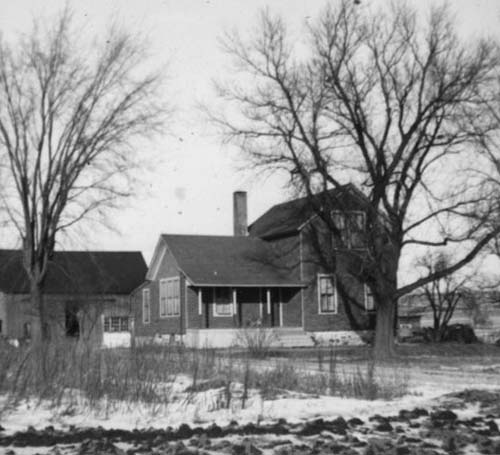 |

| |
|
|  |
Standing In The Field, February 1912.
Family Photo, 1950s.
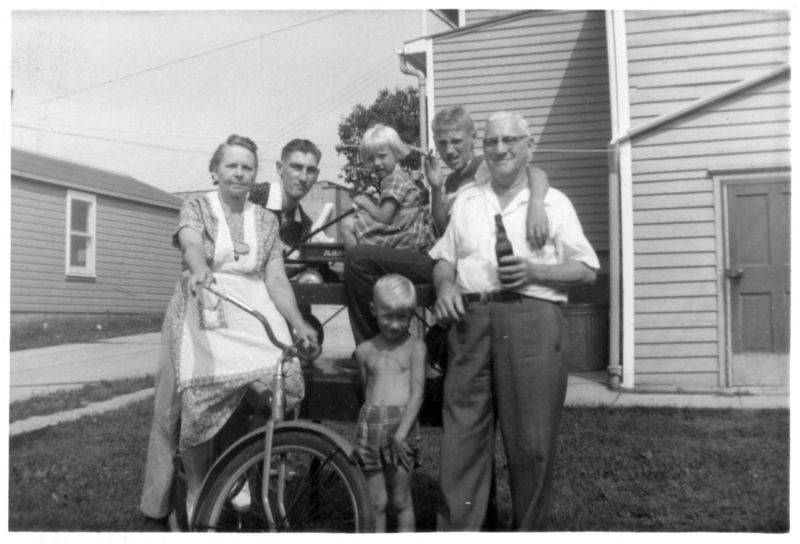 Family photo, 1950s. This photo appears to have been taken within minutes of this photo. The bicycle is a early-1940s Western Flyer, so it is possible the photo is older than I had originally thought. The girl in the background is sitting in a Radio Flyer wagon, set inside a wooden wagon, all stacked on a table. Labels: 1950s, family photos, wisconsin history
Bob, Flipo, and Elmer
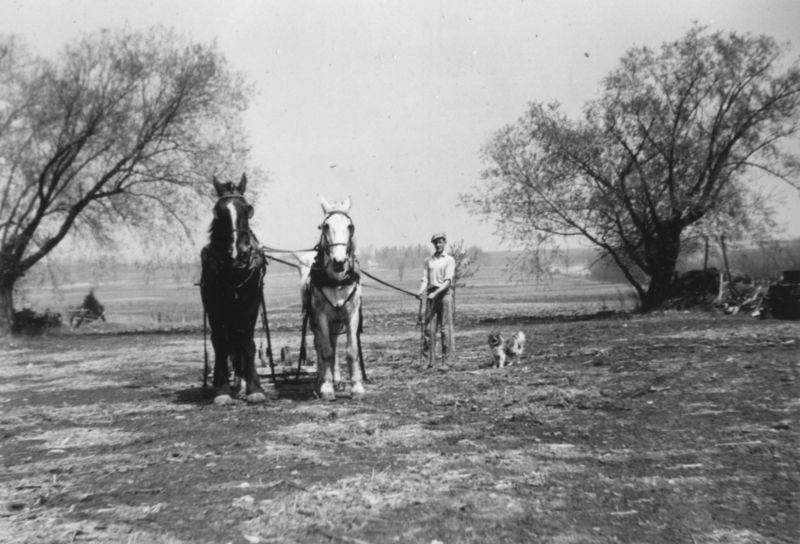 This photo was titled, " Bob, Flipo, and Elmer." However, we've got four entities in the photo: Two horses, a man, and a dog. So, who's who? Elsewhere in the album, we've met an " Elm", which is probably short for Elmer, and a Brownie, that looks a bit like this dog. So, that means the horses are named "Bob" and "Flipo." What are Bob and Flipo doing? It looks like they're hitched to a drag of some sort, scraping the surface of the ground to turn the turf under and either prepare it for planting, or just turn the weeds under so they don't become too unmanageable. Labels: 1930s, 1938, farming, horse names, wisconsin history
Iron Horse Tour of the Railroad Club of Chicago, 1964
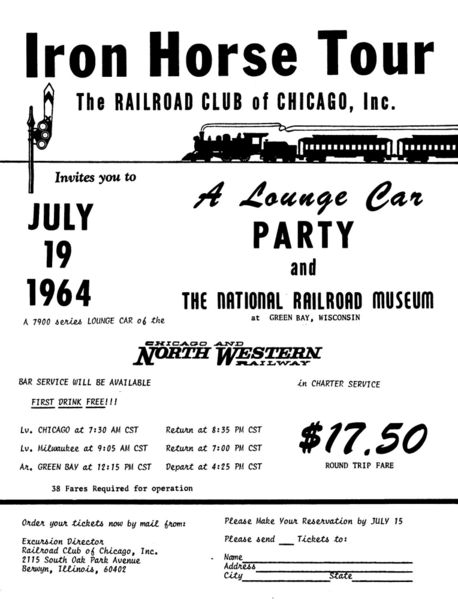 On July 19, 1964, a group of railroad aficionados piled aboard a 7900 series lounge car belonging to the Chicago and North Western Railway, en route to the National Railroad Museum in Green Bay, Wisconsin. The Railroad Club of Chicago sponsored this 'lounge car party,' bringing along friends from Milwaukee along the way, and providing one free drink in the fare. I imagine that a car-full of railroad guys -- at least 38 of them -- in a moving bar for five hours straight were a mighty friendly bunch when they disembarked in Green Bay. I'm pleased to see that the club is still around. Too often, 'archaic' clubs like these dwindle in numbers as their members age and fall away, but railroad people are an odd bunch; the romance of the rails meets men's natural affinity for huge, loud, mechanical machines, and you end up with some fun-loving guys who'll pile on a train and road-trip to Green Bay to see more trains. Today, they promote rail travel, discuss community history revolving around trains, and remind everyone that, even though trains are disappearing, they meant a lot to the United States we live in. Labels: 1960s, 1964, green bay, National Railroad Museum, railroad, Railroad Club of Chicago, wisconsin history
Miller High Life: King of Wisconsin
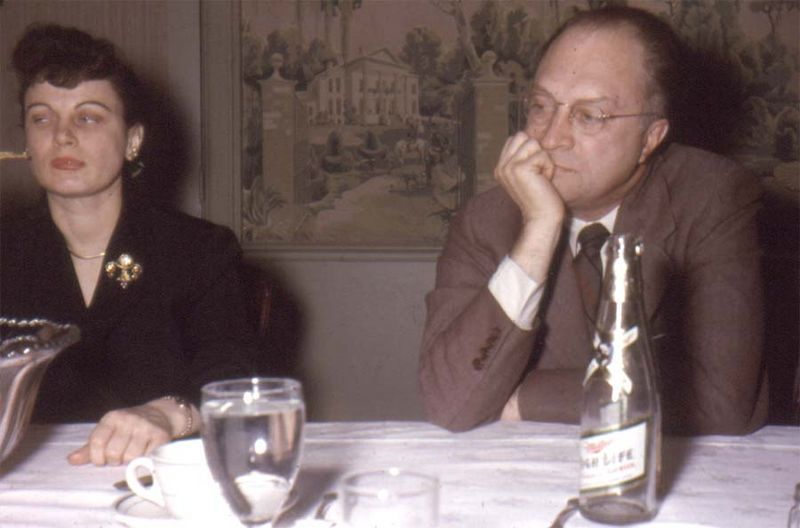 You may think Wednesday's crack about Grandma getting tipsy off a couple ounces of Miller High-Life was a joke, the photo above shows that the Cool Kids drank High Life. This is clear proof is from the Pfister Hotel set, but the distinctive trapezoid label with an 'X' sticker right above it makes the bottle very recognizable even in small photos from other sources. Granted, these photos are from Wisconsin -- Milwaukee is the home of Miller Brewing, and until the 70s there wasn't as much national distribution as there is today. People tended to drink the beer that was brewed nearby, partly out of sentimental reasons, but also because you knew the beer was fresh. Your parents probably have stories about driving to another state to buy some good beer -- driving from North Dakota to Colorado to buy up a pickup-truckload of Coors has been told to be by more than one person. One poster at Beer Advocate tells of driving to Wisconsin for some High Life...but more because of the lower drinking age of 18. As for the sentimental reasons, High Life had already been around for fifty years by the time this photo was taken -- it was "the champagne of beers", for crying out loud. Regardless if the stuff tasted like crap, you didn't dare buy something else when company was coming over, and being caught at a swanky hotel lounge drinking anything else would be a travesty. Labels: beer, miller high life, pfister hotel, wisconsin history
Getting Grandma Plastered
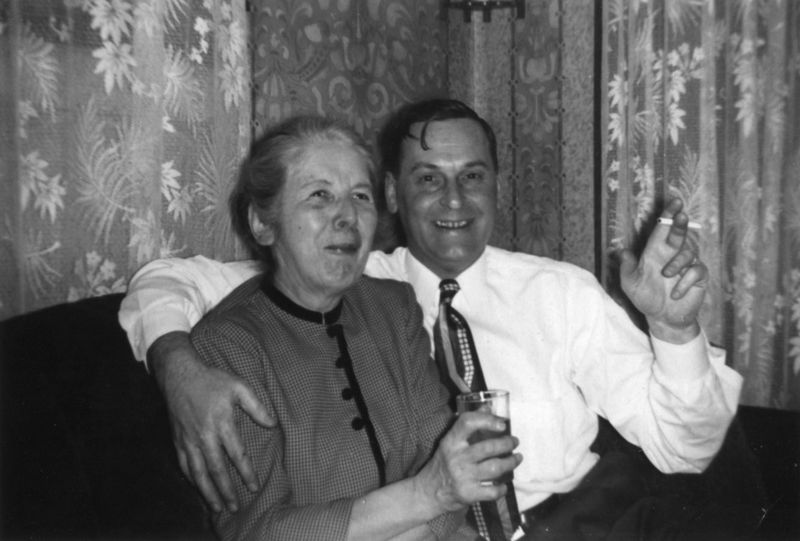 Give Grandma a jelly-jar glass of Miller High-Life, and she might start to get a bit tipsy, don't you know. Sometime in the 50s in Wisconsin, there was a party -- I've got more pictures to upload -- that prove there's a big gap in what partying means today. In the 21st century, partying is what kids do. People get wasted on their 21st birthday, get their first job and drink every Friday and Saturday in bars with loud, untalented rock bands screaming into microphones, and sleep the bender off every Sunday. By the time they're thirty, those childish ways are behind them and partying now means a $12 martini with a $20 steak and a jazz trio in the corner. The fifties were less age-centric in their parties: Kids did their partying when they had the money and time to do so, but grown-ups didn't see getting plastered as a childish activity. If you're in your thirties, ask your parents for stories about your grandparents: unless they were teetotalers, they probably had raucous parties...which, for the time period, meant listening to mildly naughty comedy records, playing cards, air so smoky it turned blue, drinking so much that someone had to be carried home, and driving all over town without fear of being stopped by the cops unless you actually hit something (then sitting bleary-eyed through church the next day). No wet t-shirt contests, no noise ordinance violations, no stepping over people sleeping on the floor at 11am who were too drunk to drive, no vomit on the front porch -- fifty years makes all the difference. Especially the wallpaper and drapes. The modernism of the sixties and seventies have ruined our decor. In the fifties, you could install flocked wallpaper without any sort of irony. Today, we might think that they had to be drunk to buy that wallpaper back then...they probably were, but it had nothing to do with the decor. Labels: drinking, party, smoking, wisconsin history
Howie and his Truck
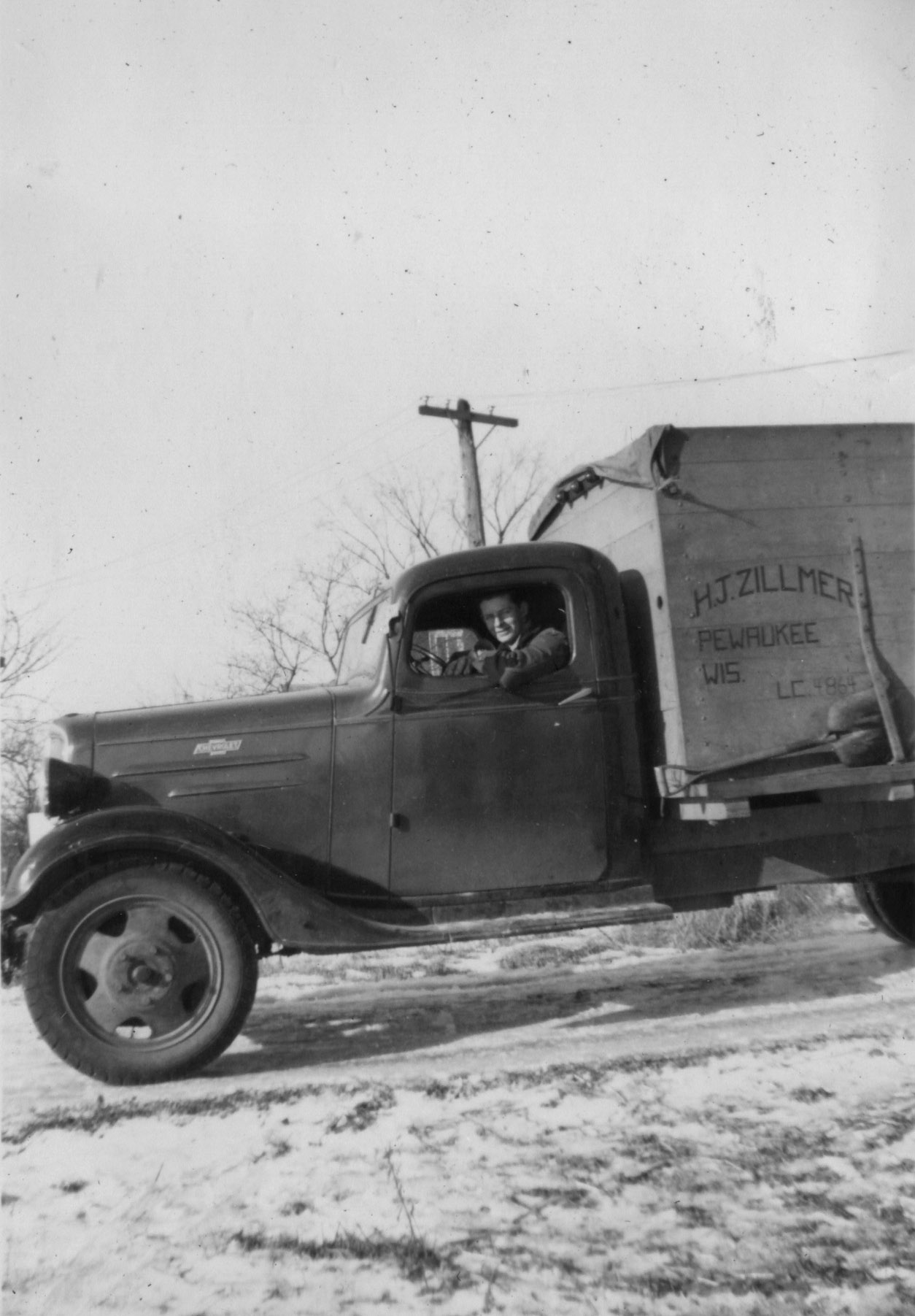 This picture was captioned " Howie." Mr. Zillmer had a truck, was from Pewaukee, Wisconsin, owned a 1930s-era Chevrolet truck, and was friends with the photographer of this album. That's about all we know -- and with this magic of the internet, can anything more be discovered? Not as much as you might think -- Howie could certainly be "Howard Zillmer" -- the internet brings us a flyer from a church in Florida that lists Zillmer's birthday as January third -- Florida's quite a ways away from Wisconsin, though. 2003 brought us the obituary of a Howard Zillmer's mother, Augusta, who had been born in 1910 and lived in Pewaukee. Howard E Zillmer enlisted in the military in Milwaukee shortly after World War II broke out, but -- also in Milwaukee -- Howard R Zillmer held out until '43. Our photogenic Howard, however, looks older than any of the possible Howards on the internet. If internet archives have slowly reached back to the '40s, maybe eventually we'll be able to find Howie. Until then, he's remembered for driving his grain truck past Ruth. Labels: 1930s, 1938, chevrolet, pewaukee, truck grain, wisconsin history
A Sea Of Hats: Farm Foreclosure Sale
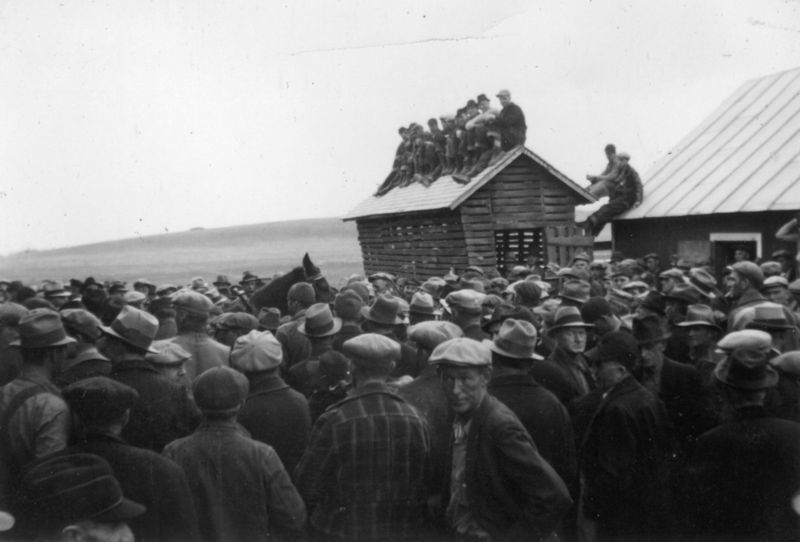 This image This image, one of two captioned "At Uncle Nick's Auction," shows a common sight around the rural USA during the 1930s. No, not just a crowd of fedoras and paperboy hats (although those were quite common, especially at the employment office or the bread lines). Farm foreclosures were driven by the Great Depression, a sluggish economy, a prewar slump due to foreign instability, and the ongoing change from a raw-materials economy to a manufacturing economy. This one appears to have been taken in 1938, after the "heyday" of foreclosures in the early 1930s. Early on, farmers protested and caused 'penny auctions' -- friends and neighbors ran off genuine bidders, and never bid more than a penny for any lot. By the late 1930s the worst of it was over, some economic reforms were starting to help, and this auction was probably handled better than frantic bank-recoveries earlier in the decade. Also: farmer's diary * iowa depression * nebraska foreclosures * remembering farm life Labels: 1930s, 1938, antique photo, farm life, wisconsin history
Claiming Her Own Nickname
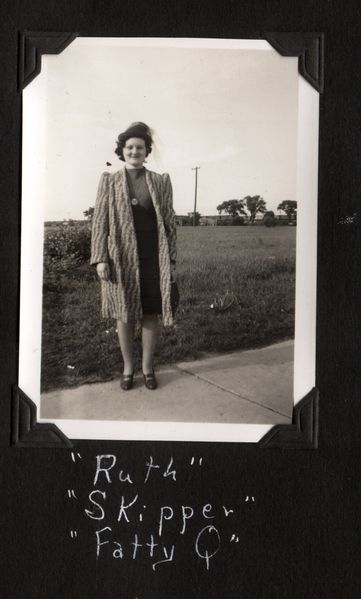 Here, to the right Here, to the right, is Ruth. She once had a photo album of her life in the late 1930s, which I've started scanning recently. On the second page of the album, she has a series of captioned photos captioned as a dramatis personae, identifying the players in her life. Her self-portrait includes several nicknames -- "Fatty Q" being one of them. While not the lithest of ingenues, Ruth isn't obese, so that might be why she's accepted the nickname without offense. The nickname of 'Skipper' is interesting, too. The two things we associate 'skipper' with -- the fat guy on Gilligan's Island, and Barbie's sister -- were decades away from Ruth's life. Captaining a boat was the main definition, although 'one who skips' could mean she either has a slight jump in her step, or maybe she prefers to avoid going to class. Either way, Ruth has two 1930s nicknames that she was proud enough to own to save it for her kids to see: I hope she was still as proud of them years later. Labels: 1930s, 1938, vintage photo, wisconsin history
Laziness and the P.W.A.
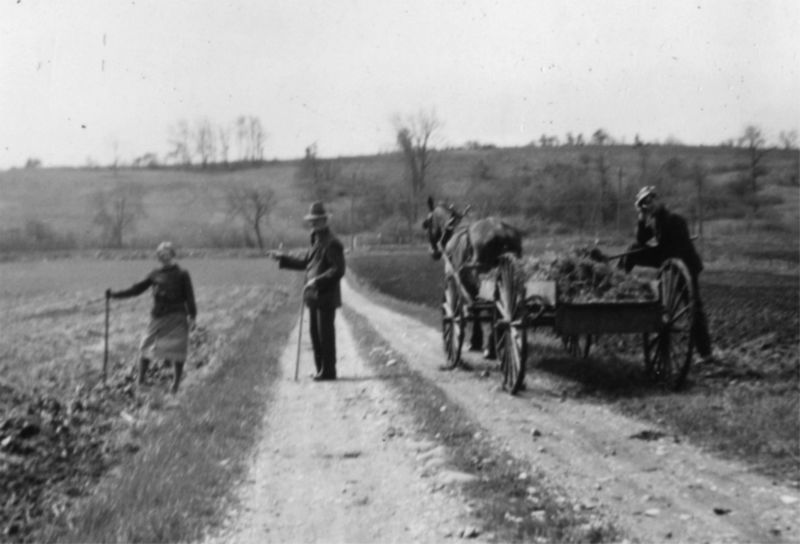 In 1933, the US government starting putting a large amount of money into public works, helping the economy, building communities, and keeping people working. The PWA, or Public Works Administration, did a lot of high-profile work, but the PWA helped communities and projects of all sizes. This picture was captioned "P.W.A. Workers" -- however, they look hardly like a PWA project. The owner of the photo album had a sense of humor; the PWA (and its relative, the WPA) had a somewhat undeserved reputation for laziness. Ms. Photographer, it seems, saw a woman in the field -- and the guys not working -- as representative of the PWA, whether or not their paychecks came from the New Deal or not. see also: the pwa *pwa thoughts * *pwa and nat'l parks * the wpa * wpa murals * wpa in georgia * wpa postersLabels: 1930s, 1938, farm life, farming, public works administration, pwa, wisconsin history, wpa
Party at the Pfister, 1960
John Till, the Somerset Doctor
|  |
|
|
